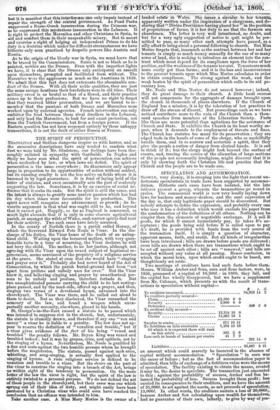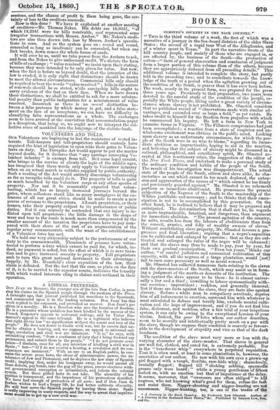SPECULATION AND ACCOMMODATION.
SLOWLY, very slowly, it is creeping into the light that recent un- fortunate speculations in trade have been supported by accommo- dation. Hitherto such cases have been isolated, but the late failures present a group, wherein the transactions go round in cycles. The commercial world is now very loudly laying down laws for bankers and money-dealers, and the cant expression of the day is, that only legitimate paper should be discounted. But nobody attempts to define the expression, and probably every one who uses it has a definition which would exclude his paper from the condemnation of the definitions of all others. Nothing can be simpler than the elements of negotiable exchange. If A sell B goods, for which B cannot immediately pay, he takes B's ac- ceptance; the goods being sold before B is called upon to pay A's draft, he is provided with funds from the very source of the transaction itself. It is simply a question of character, apparent means, faith, and credit. But all kinds of irregularities have been introduced ; bills are drawn before goods are delivered ; cross bills are drawn when there are transactions which ought to be set off against each other ; bills are "renewed," and bills are accepted without any value at all passing. Hence confusion, in which the moral laws, upon which credit ought to be based, are thoughtlessly set aside.
Two meetings of creditors have had each facts before them.. Messrs. William Archer and Sons corn and flour factors, were, in 1856, possessed of a capital of 10,3001. : in 1860, they fail, and. the capital has wholly disappeared, but we have a supplement from Mr. Coleman, which presents us with the result of trans- actions in speculation without capital-
s.
To creditors unsecured
34,925 14 2
To creditors partially secured—
Claim £2,500 0 0
Security 2,000 0 0
Deficiency 600 0 0
To creditors fully secured—
Security 12,354 10 0
Claims" 11,682 10 1
Surplus to contra 671 19 11
To liabilities on bills receivable 1,194 15 10
Of which it is expected there will rank on this estate 303 2 6
Less cash in hands of bankers per contra 41 7 9
261 11 9
Liabilities
35,687 8 11 an amount which could scarcely be incurred in the absence of capital without accommodation. " Speculation " in corn was the cause of failure ; but as the fact of accommodation paper is admitted, then bills of exchange of a fictitious value were the means of speculation. The facility existing to obtain the means, created it may be, the desire to speculate. The transaction just amounted to this ; against the probability of success, Archer and Son ba- lanced the probability of loss. Success brought them profit ; loss carried its consequences to their creditors, and we have the amount of 35,000/. to set against the assets, as net proceeds of speculation, 15,000/. In other words, the creditors sustain a loss of 20,0001., because Archer and Son calculating upon wealth for themselves, had no guarantee of their own, latterly, to give by way of pos-
sessions and the chance of profit to them Being• gone, the cer- tainty Of loss to the creditors succeeds. How is this done ? We have it explained at another meeting of creditors—Mr. Thomas Nokes. His debts are 18,051/., "of which 13,234/. were for bills receivable, and represented some irregular transactions with Messrs. Archer." Mr. Nokes's credi- tors are also thus drawn into loss by Messrs. Archer's specula- tions in corn. And so the system goes on ; round and round, concealed so long as insolvency can be concealed, but when one
• link breaks, down comes the whole house of cards.
It will ever be so' until we take power from the Archers to ask, and from the Nokesto give unlicensed credit. We dictate the form of bills of exchange ; "value received" we insist upon their stating, because they were intended to be only given for value. But now, when the fact is before us beyond doubt, that the intention of the law is evaded, it is only right that distinctions should be drawn to meet the altered circumstances. Commercial bills only should be required to bear the words "value received " • bills in the nature of renewals should be so stated, while suretyship bills ought to carry evidence of the fact on their face. When we have drawn these distinctions, we shall be entitled to ask for a more substan- tial penalty than public indignation for a misstatement of value received. Inasmuch as there is no moral distinction be- tween a false pretence by which money is got, and a false state- ment on the face of an acceptance, we can have no difficulty in classifying false representations as a whole. The exchanges seem to have arrived at the conviction that accommodation-paper is a deception, that being so, we ought now to interpret the col- lective sense of mankind into the language of the statute-book.



























 Previous page
Previous page